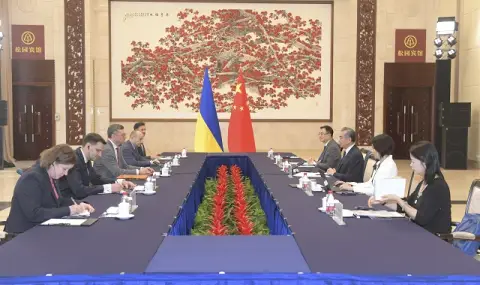Kiev is open to talks with Russia, if Moscow is ready to negotiate in good faith, but for now there are no such signs. This was stated by Foreign Minister of Ukraine Dmytro Kuleba during his talks with Chinese Foreign Minister Wang Yi in the southern Chinese city of Guangzhou, reports "Reuters".
Foreign Minister Dmytro Kuleba is the most senior Ukrainian official to travel to China since Russia invaded in February 2022. He spoke with Foreign Minister Wang Yi for more than three hours, a Ukrainian source in the delegation said.
"Kuleba reiterated that Kiev is ready to engage the Russian side in the negotiation process at a certain stage, when Russia is ready to negotiate in good faith, but stressed that at the moment there is no such readiness on the part of the Russian side,", it is said in statement of his ministry.
During the negotiations, Kuleba also said that a just peace in Ukraine is in China's interest, in particular, it facilitates its trade with Europe. He added that relations between Beijing and Kyiv are worth building, given Ukraine's future membership in the European Union, for which negotiations have already begun.
After the start of the full-scale aggression against Ukraine, Western countries banned the supply of many goods to Russia. They also accuse China, which has not joined the sanctions, of providing Moscow with products that help it make weapons.
"Russian aggression not only stands in the way of Ukraine's development. It also hinders international stability, the development of good neighborly relations and, in particular, the development of trade between China and Europe," Kuleba stressed.
The Ukrainian foreign minister also said that Kiev has studied the joint Chinese-Brazilian position. The two countries published their proposals on May 23 this year after a meeting between Wang Yi and Brazilian President Celso Amorim's chief adviser. The two countries then called for:
adherence to the three principles of de-escalation of the situation (not to expand the territory of military actions, refusal of escalation of hostilities and provocations);
convening an international peace conference, recognized by both Russia and Ukraine, to discuss all plans;
avoidance of attacks on civilians or objects, protection of civilians, especially women and children, exchange of prisoners of war;
renouncing the use of nuclear, chemical or biological weapons;
avoiding attacks on nuclear power plants and other nuclear facilities;
opposing the division of the world into isolated political or economic groups of countries.
China, the world's second largest economy, has positioned itself as neutral on the war, but has announced "limitless" partnership with Russia days before the 2022 invasion and hosted President Vladimir Putin for talks, most recently in May.
China also provided diplomatic support to Russia and helped preserve Russia's wartime economy.
"Talks have just ended. They lasted over three hours in total, longer than planned. It was a very thorough and specific conversation," a Ukrainian source in the delegation told Reuters.
A Chinese Foreign Ministry spokesman said at a regular press conference in Beijing that both ministers spoke of the need to take a long-term view of building bilateral ties and that China would "continue to expand its food imports from Ukraine".
The Kremlin told reporters that Kuleba's remark appeared to match Russia's own position, but needed more details to assess what was on offer.
Russian President Vladimir Putin said in June that Moscow would end the war if Kiev withdrew and handed over the remaining four partially occupied Ukrainian provinces and gave up its NATO ambitions, an idea rejected in Kiev as an absurd ultimatum.< /p>
Kiev plans to hold a second international summit later this year to develop its vision for peace after the initial meeting in Switzerland in June attracted dozens of delegations from around the world, but not from Russia or China .
Ukraine has said it would like its second summit to be hosted by a country from the "global south" and that Russia should be present.
Hungarian Prime Minister Viktor Orbán is traveling to Kiev, Moscow and Beijing and Washington this month on what he described as a "mission for peace".
Ukrainian President Volodymyr Zelensky rejected Orban's efforts, saying only powerful countries such as the United States, China or the European Union bloc are capable of playing a mediating role.
China and Brazil published a joint six-point peace proposal in May, saying they supported holding an international peace conference that both sides in the war would recognize.
